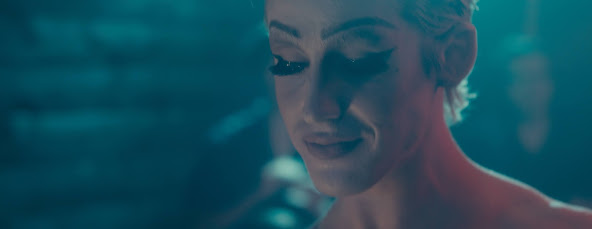On the run from law enforcement, arsonist Simon (Kyle Gallner) tries to raise some quick cash for his secret punk band PsyOps, for whom he adopts the persona of the mysterious balaclava-clad frontman, John Q. After befriending the socially awkward Patty (Emily Skeggs), the pair begin to stir things up in their boring, suburban town like a pair of outlaws, with Patty unaware that Simon leads a double life as the punk singer she's been sending love poems and sexy polaroids too. Directed by Adam Rehmeier and produced by Ben Stiller, Dinner in America is available from June 1st on the Arrow Player.
A dependable screen presence but perhaps lacking a signature role, Gallner, with his borderline neo-nazi haircut and permanent "fuck you" attitude, chews up every scene here with a sneer on his face and a cigarette in his mouth and enjoying every second of it. Simon is abrasive, sociopathic, an affront to traditional suburban American values and precisely the sort of agent of chaos the meek, shy Patty needs injecting into her drab life, cleaning the cages in a pet store. Apart from her supporting role in The Miseducation of Cameron Post, I was unfamiliar with Skeggs's previous roles, and although her Patty might start the film as something of a black canvas, she has fun taking her to where she ends up.
The film is interspersed with a series of traditional polite family dinners (hence the title), with Simon the inciting influence that the topic of conversation tends to veer away from what you'd expect over the dinner table and most often no-one's sticking around for dessert. It's at these moments where the film's rich vein of black humour comes to the front, with Simon unafraid of being outright hostile towards his hosts, whether it's revealing to one young boy that he's adopted or accepting the sexual advances of a bored housewife (Lea Thompson in a brief cameo, adding to the great supporting cast of Mary Lynn Rajskub and Pat Healy as Patty's parents).
Wearing its 'young couple on the run' movie influences on its sleeve, it's Badlands meets Buffalo '66 with the comic sensibilities of David Cross's directorial debut, HITS (an under-seen gem). Although certainly not conventional, in many ways it's a true romance, with Simon and Patty moving from animosity to unsteady friendship to pure renegade lust for each other, once they reveal their true selves and then can't bear to be apart from one another. Dinner in America may have a cold, black heart, but for sure it's still beating. Right up there with the best f-ed up love stories, Dinner in America offers so many great moments that make you want to cheer Simon and Patty on, like getting revenge on not one, but two pairs of locals who routinely call Patty a "retard", a surprisingly fruitful musical collaboration that will still be playing in your head once the credits have rolled, and fun details like a license plate that says "69URMOM" and lines like "you fucks just made my shit list".But what's most impressive is how director/writer/editor Adam Rehmeier has managed to deliver a story with a real, anarchic punk attitude - something other films claim to offer, but that Dinner in America does with ease. That's in no small part thanks to Gallner and Skeggs, who have a real combustable energy whenever they're on screen together in a film that's fiery, funny and kinda fucked up in the best possible way.
Verdict
4/5
Dinner In America is available on:
ARROW, Apple TV, Amazon, Google Play, Sky Store, Microsoft, Kanopy
£9.99 to buy
£5.49 to rent
Subscriptions are available for £4.99 monthly or £49.99 annually
Head to ARROW and start your 30-day free trial. Available on the following Apps/devices: Roku (all Roku sticks, boxes, devices, etc), Apple TV; iOS devices, Android TV and mobile devices, Fire TV (all Amazon Fire TV Sticks, boxes, etc), and on all web browsers at www.ARROW-Player.com.






















